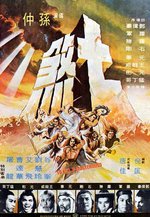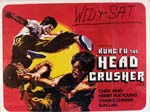1968
Director: Kimiyoshi Yasuda
Starring: Raizo Ichikawa, Mako Midori, Maka Sarijo
This incredible samurai film series goes under several different titles. Some know it as the Kyoshiro Nemuri series (named after the main character). Animego (it's official dvd releasing company) has given it the title Sleepy Eyes of Death (the literal translation as far as I know) and this is the name it is now most well known under here in the States. However, back in the mid eighties (which is when I first heard of these films) it was known as Son of the Black Mass and this is the title I'm choosing simply because it's the one I'm most familiar with. Besides, Son of the Black Mass is one of the coolest sounding film titles I've ever heard, especially for a samurai series.
Originally a series of novels penned by Renzaburo Shibate, Kyoshiro Nemuri is the ultimate nihilistic antihero; a red haired masterless samurai who's exsitence is the result of a Buddhist Nun's rape at the hands of a Portugese Satanist (posing as a Catholic Priest) during a black mass ritual. He has a built in hatred for all things Christian as well as anything in relation to the Shogunate. He is also a self confessed womanizer and is not interested in the downtrodden. O.K. Kyoshiro has hatred and/or disdain for just about everything. Of course, when you are an infamous red haired ronin, trouble has a way of finding you. Nemuri has no problem with trouble. In fact, he invites it and will often challenge an oppressor NOT because he is in any way heroic, but out of sheer boredom. Ultimately, it seems that our protagonist is looking for someone skillful enough to kill him. This is much easier said than done since he is the master of the nearly invincible (and ficticious) Full Moon Sword style (he flicks his sword backwards and slowly makes a counter clockwise circle).
A film series began in 1963. The first twelve starred Raizo Ichikawa, one of the most beloved actors in Japan's history. During his heyday in the 50s, he was often referred to as the Japanese James Dean. By the 60s, he had matured into an amazingly intense screen presence. As Nemuri, Ichikawa brought a true sense of fatality to the role. Despite the character being almost completely unsalvageable, one can read a tremendous amount of pain and tragedy in his expressive eyes that gets audiences squarely on his side... in spite of themselves. Sadly, Ichikawa succomed to cancer in 1969 at the much too young age of 37. He continued to make movies right up until the final weeks of his life.
As the film series progressed the stories and images became more bizarre, matching the perverse nature of the books. The final four films are among the finest samurai/martial arts movies ever made. The Human Tarantula, the eleventh in the series made in 1968 (and the last in which Ichikawa appeared in full health) was maybe the greatest of them all. It is also arguably the seediest.
Directed by Kimiyoshi Yasuda (a veteran director of this series as well as the Zatoichi films and many more), this entry more than any other successfully combines traditional samurai themes with the sheer depravity that is associated with the basic story and mixes in borderline horror elements to make for a mesmerizing viewing experience. The story starts with Nemuri paying his respects at his mother's grave. While staying at the village, he comes upon a particularly loathsome and horrific scene; a castle containing the incestous children of the Shogun. The brother and sister regularly kidnap local villagers and keep them as captives while they devise various ways of killing them. The sister suffers from fits that subside only with the killing of someone in front of her (yeah, it's THAT kind of deal). She immediately falls in love with Nemuri, who rejects her (initially anyway). This in turn enrages the jealous brother who is a master of poison.
I should mention that as nasty as the whole thing sounds, this (and the others in the series) is a surprisingly restrained film. There is no nudity on display here (though plenty is implied) which is especially surprising coming from a Japanese film of this vintage. There's also comparitively little blood on display. This does however contain imagery and cinematography worthy of Bava. It plays as much like a gothic horror film as it does a samurai epic. It's all topped with an eerie music score (using horns and haunting female voices) that sounds like some unholy Japanese version of a Morricone Western riff.
The Human Tarantula may not be the ideal first Nemuri film to see (the fourth one, Kyoshiro Nemuri at Bay is in my opinion, the best starting point), but it is the one that best epitomizes what this series is all about. It is also one of the best martial arts/exploitation films ever to be released from the land of the rising sun.
**** / ****




+-+Poster+1.jpg)
